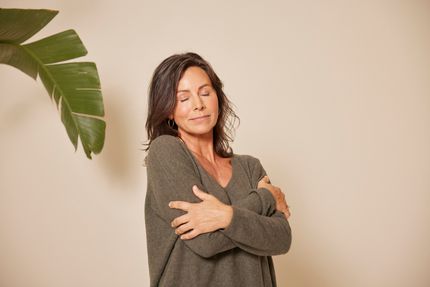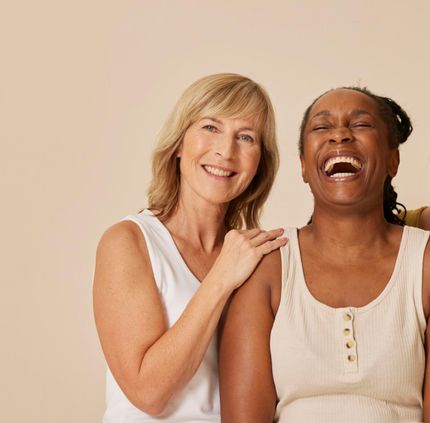Osteoporosis and menopause
Losing bone is a normal part of ageing, but this doesn’t mean it always happens as early as perimenopause. There are things you can do to improve bone health and minimise risk of fracture. This is important, because strong bones provide support for your body and protect your organs. Nevertheless, osteoporosis affects one in three women, and the risk of getting it also increases with age. So how can you keep your bones strong and healthy?

I thought that osteoporosis was something that only affected old ladies. But my doctor told me that menopause can also affect bone health. - Yvonne (age 57)

Research indicates that around 20 percent of bone loss in women happens during their menopausal years. In general, women are more likely to experience prolapses or fractures, such as a broken wrist, hip or vertebra, late in postmenopause (10 to 20 years past menopause).
Osteoporosis is called a ‘silent disease’ because bone loss happens without any warning signs. In fact, many people are not aware they have this condition until they have symptoms (such as back pain) or suffer a fracture or vertebral collapse. The good news is that by caring for your body the pitfall of osteoporosis can be avoided and bone loss can be slowed down.
Besides having a higher risk of osteoporosis, you may also experience other menopausal symptoms, such as skin ageing, low sex drive and hot flashes.
What is happening in your body?
Oestrogen is known to play an important role in bone health in both men and women. Oestrogen enables your body to produce osteoblasts, the cells that create new bone.
When oestrogen levels drop in the years leading up to menopause, the risk of osteoporosis increases. Osteoporosis is a disease that causes bones to become weak, brittle and more likely to fracture.
Calcium and Vitamin D are also important building blocks for healthy bones. Calcium keeps bones strong, and Vitamin D helps absorb calcium.
Other causes
Women are more at risk of developing osteoporosis than men because of hormonal changes that happen around menopause. Other factors that can increase the risk of osteoporosis include insulin resistance, alcohol, smoking, chronic inflammation, certain medications and stress.
When you're constantly stressed and always ‘on’ your body produces cortisol non-stop. Elevated cortisol levels interfere with osteoblast formation and dramatically decreases bone building, resulting in reduced bone density. Put simply: stress negatively impacts bone formation.
Do you have a demanding job, many obligations outside of work and little time for yourself? Don’t forget that you need to relax, too. Set priorities, accept that you cannot juggle all the things in your life at all times, and discover the power of short relaxation exercises and taking short breaks.
How do you prevent osteoporosis?
It has been scientifically proven that a healthy lifestyle plays a major role in maintaining bone health. A healthy diet, exercise and good posture are key.
- Nutrition is the most important factor for bone health. In particular adequate intake of calcium and Vitamin D, magnesium and Vitamin K. Vitamins D, K and magnesium help absorb calcium. You get Vitamin K and magnesium from food. Vitamin D is produced in the skin when exposed to sunlight. Vitamin D supplements are commonly recommended in countries with little sunlight to achieve adequate levels.
- Good posture is more important than any form of exercise. Be aware of your posture. Sit and stand up straight, pull your belly button to your spine, and let your shoulders hang naturally.
- Improve muscle strength and balance. Activities that put pressure on the bones strengthen both the muscles and the bones. This doesn’t mean you have to spend hours in the gym weightlifting. Just make sure you get regular physical activity during the day. Combine 30 minutes of high-energy walking with low-impact activities, such as Pilates, yoga or swimming.
- Quit smoking and reduce your alcohol intake. Smoking and drinking are bad for bone health.

Medication for osteoporosis
Strong bones are essential for overall health and quality of life. When your bones start to get weaker, you can support bone health with medication or supplements. There are various options to build up resistance to osteoporosis.

What treatment is right for you?
According to specialists, hormone replacement therapy (HRT) is a safe and effective solution that may be used to manage (or prevent) osteoporosis. Do you have osteoporosis or have a higher risk of developing it? And do you choose not to use HRT or cannot use HRT due to it being contraindicated? There are other treatments available.
Hormone therapy for osteoporosis
HRT medicines contain both female sex hormones: oestrogen (oestradiol) and progesterone. HRT can reduce the risk of osteoporosis by stabilising hormone levels and evening out fluctuations. Options include Trisequens or Femoston, both bioidentical hormone therapies using oestradiol and progesterone.
Non-hormonal medication
What if you can't or don't want to use hormones? There are also non-hormonal medications, such as Alendronic Acid or Evista, which prevent osteoporosis after menopause and reduce the risk of fractures. Both medications are available in tablet form. Alendronic acid has been proven effective in supporting bone growth in women after menopause.

I found out I have osteoporosis after a spinal fracture. I was put on HRT straight away. - Barbara (age 50)

Sources
- Cauley JA. (2015). Estrogen and bone health in men and women. https://www.sciencedirect.com/
- Stevenson J, medical advisory council of the British Menopause Society. (2022). Prevention and treatment of osteoporosis in post menopausal women. https://thebms.org.uk/publications/consensus-statements/prevention-and-treatment-of-osteoporosis-in-women/
- Sheng B, Li X, Nussler AK, Zhu S. (2021). The relationship between healthy lifestyles and bone health: A narrative review. Medicine (Baltimore). PMID: 33663079.
- Pereira RM, Delany AM, Canalis E. (2001). Cortisol inhibits the differentiation and apoptosis of osteoblasts in culture. Bone. PMID: 11344047.
- Moradell A, Rodríguez-Gómez I, Fernández-García ÁI, Navarrete-Villanueva D, Marín-Puyalto J, Pérez-Gómez J, Villa-Vicente JG, González-Gross M, Ara I, Casajús JA, Gómez-Cabello A, Vicente-Rodríguez G. (2021). Associations between Daily Movement Distribution, Bone Structure, Falls, and Fractures in Older Adults: A Compositional Data Analysis Study. PMID: 33916857.
Your path to a smooth menopause starts here
Get the tools you need to navigate menopause with more ease and to educate yourself about your body. With tips and insights from experts, and relatable stories of women just like you. Press play, not pause.
Tips and advice


FAQ
How do I know if I have osteoporosis?
Research indicates that around 20% of bone loss in women happens during their menopausal years. Osteoporosis is called a ‘silent disease’ because there typically are no warning signs in the early stages of the disease. This means your bones can become weak and brittle without you noticing. So it’s important to take care of yourself regardless of your age and even if you think you are healthy. If your doctor suspects you have osteoporosis, a bone density test (DEXA scan) may be done to assess your bone strength.












